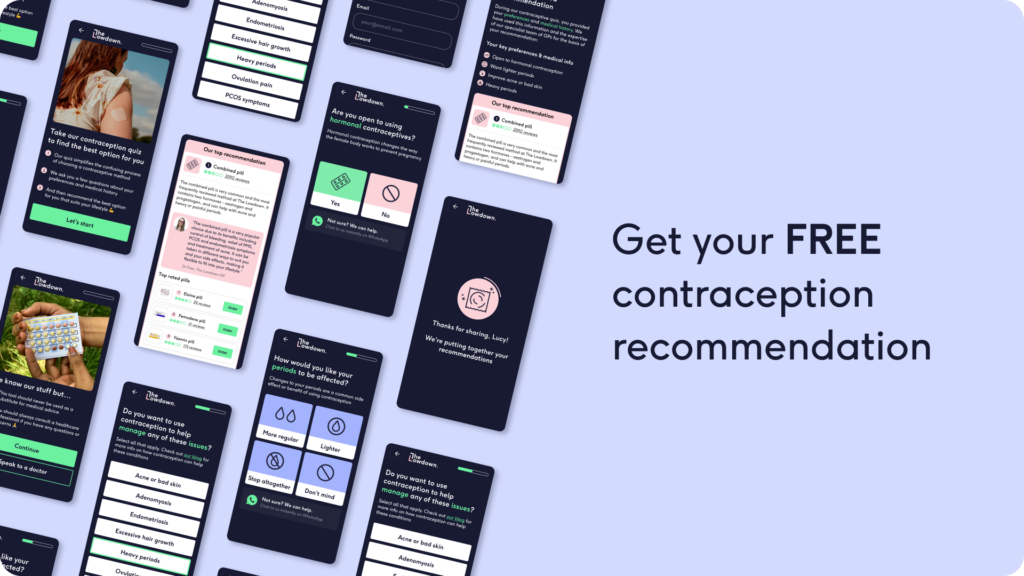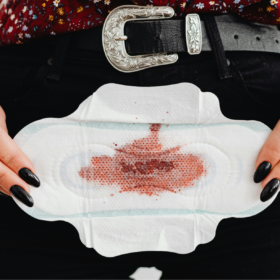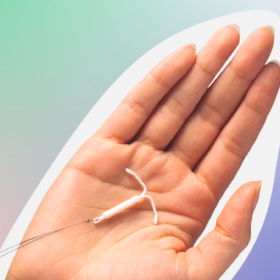
Periods on the pill – are they real or fake?
In this article
What's the lowdown?
Bleeding experienced during pill-free breaks on combined contraception such as the pill, patch or ring is called withdrawal bleeding
Unscheduled bleeding on contraception is called breakthrough bleeding or spotting, and can be light brown discharge or like a real period
Religiously sticking to the ‘21 days on and 7 days off’ ritual of the pill is second nature for many women. But this often comes with the common misconception that the seven-day break allows for the no-surprise, regular-like-clockwork period.
But with updated guidance recommending the continuous use of the pill without the need for a break, confusion surrounds what this monthly bleeding is actually all about! So, if it isn’t a period, what is it?
So… what is a period?
Let’s start off by going back to basics. We often talk about a typical cycle of 28 days. Whilst this is in fact the average, a normal cycle can range from 21 to 35 days. The luteal phase, which occurs after ovulation, typically lasts between 10 and 16 days.
Each month your body readies itself for pregnancy, with the thickening of the lining of the uterus (aka womb) in preparation for a fertilised egg. When this doesn’t happen, the uterus sheds its lining. This is your period and day 1 of your cycle.
Ovulation usually occurs around day 14 of the menstrual cycle. Whilst we can generally assume a regular monthly cycle to be an indication of ovulation – the process in which an egg is released from the ovaries – this is not necessarily always the case.
Anovulation is the term used to describe the lack of ovulation within a cycle. The most common reason for anovulatory cycles is when you’ve just started menstruating or leading up to the menopause (where periods stop altogether). Other conditions like polycystic ovary syndrome can cause anovulatory cycles.
It’s interesting to note that external factors can affect whether you ovulate. Besides oestrogen and progesterone – the main players in the menstruation game – the pituitary gland offers its skills to the mix; namely producing luteinising hormone (LH) and follicle-stimulating hormone (FSH). This gland is controlled by hormones from the hypothalamus in the brain, which reacts to experiences and threats placed upon us, deciding if this month is the right month to become pregnant.
Illness, weight loss, and disruption in sleep patterns can all be perceived as negative situations by the hypothalamus which controls the menstrual cycle, thus preventing the release of an egg: a remarkable evolutionary feature or a judgemental biological bystander? Maybe a bit of both!
Occasional anovulation will often go undetected but if you’re not using hormonal contraception and are experiencing erratic, infrequent periods or no periods at all over a few months then speak to your doctor.
Why do we have periods?
Periods and fertility are inextricably linked. Oestrogen and progesterone are hormones that play a vital role in periods and the all-round health of a woman. Dr Jerilynn Prior spoke to The Lowdown’s founder Alice and discussed this in more detail in our webinar; the lowdown on periods.
Are periods on the pill real?
The bleeding you experience on the combined pill, if you have a pill free break between pill packs, is called withdrawal bleeding and is a response to the withdrawal of the hormones in the pill – hence the name! This is what we mean by a fake, or false, period.
One of the ways hormonal contraceptives work to prevent pregnancy is by thinning the lining of the womb, known as the endometrium, by reducing its growth. It’s this effect that impacts the bleeding and often results in lighter withdrawal bleeds on the pill-free break versus the bleeding experienced during a period.
The reduced growth of the endometrium is why monthly bleeds are no longer necessary and why withdrawal bleeding cannot be used as a reliable indicator that you’re pregnant. (More on this later.)
It’s important to remember that if you do decide to take a break from the combined pill, it should be no longer than 7 days as any longer may mean you ovulate, reducing its contraceptive efficacy.
So, periods on the pill aren’t real. Does that matter?
No! In fact, for some women, ‘fake’ periods are better! Hormonal contraception can offer a solution to women who are plagued by heavy or painful periods. ‘How contraception can help with heavy and painful periods’ gives more info on this. One user of The Lowdown who is currently taking the combined pill Rigevidon wrote:
“I suffer from very heavy periods normally and it’s made them much lighter and less painful.”
Combined contraceptive methods (the pill, patch and ring) can also offer flexibility around if and when you want to bleed, see our guide on continuous pill taking. Although bleeding on progestogen-only methods including the mini-pill and the implant are generally unpredictable.
Long-term use of combined hormonal contraceptives does not have any impact on long-term fertility. So it can be a win-win all round.
Does the mini pill stop periods?
Yes. your periods will stop. In fact, this is true for most hormonal contraception. But that’s in the technical sense, as hormonal contraception disrupts the menstrual cycle you may no longer have ‘true’ periods. This is the case if you’re taking the most common types of the progestogen-only pill, or mini pill which stop you ovulating.
You may however still experience bleeding whilst on the mini pill in the form of breakthrough bleeding. As with the combined pill, the lining of the uterus thins as a result of the progestogen. Bleeding on progestogen-only methods can be unpredictable for some or stop altogether for others.
Those taking the combined pill may also experience breakthrough bleeding, especially if taking the pill continuously. The pill is still working as an effective contraceptive if you are taking it reliably. If you’ve taken the pill for 21 days or more consecutively, a short break of up to 7 days where you have a scheduled bleed may improve any breakthrough bleeding. Read more in our continuous pill taking blog here.
But remember: do not take a break from the mini-pill unless you’re prepared for a break in contraceptive protection. The mini pill and combined pill view breaks in very different ways. Think: the Ross and Rachel of the contraceptive world!
Does a light or normal period on the pill mean I’m not pregnant?
If the question is ‘I’m experiencing bleeding, can I be pregnant?’, well, yes, you could be.
It all comes back to the differences between a period, withdrawal bleeding, and breakthrough bleeding. A period is all about the preparation for pregnancy: if the egg released has not been fertilised, the lining of the uterus is shed alongside the unfertilised egg.
But withdrawal and breakthrough bleeding are different to a normal period and are often lighter and less frequent. Bleeding during pregnancy can also occur, and may for example be caused by implantation bleeding – where the developing embryo attaches to the wall of the uterus – or changes to the cervix (the neck of the womb) caused by pregnancy. If spotting occurs, it may be mistaken for withdrawal or breakthrough bleeding. Investing in some period pants, such as WUKA or Modibodi, could help you feel more secure going about your day without worrying about spotting.
The moral of the story? If in doubt, check it out! If you suspect you may be pregnant, a simple pregnancy test is the easiest way to find out. And consult your doctor if you’re experiencing any unusual bleeding that is causing you concern. Spotting whilst on the pill or during pregnancy can be entirely normal, but it may also be a sign of something more serious.
For further advice, why not book an appointment with one of our doctors here at The Lowdown? We offer online consultations at a time that suits you, all from the comfort of your own home. Giving you the perfect opportunity to have in-depth discussions on contraception advice, with medical professionals who are passionate about finding the best contraceptive match for you. Alternatively, using our contraceptive recommender you can easily be matched with the best contraceptive for you.

Our medical review process
This article has been medically reviewed for factual and up to date information by a Lowdown doctor.






